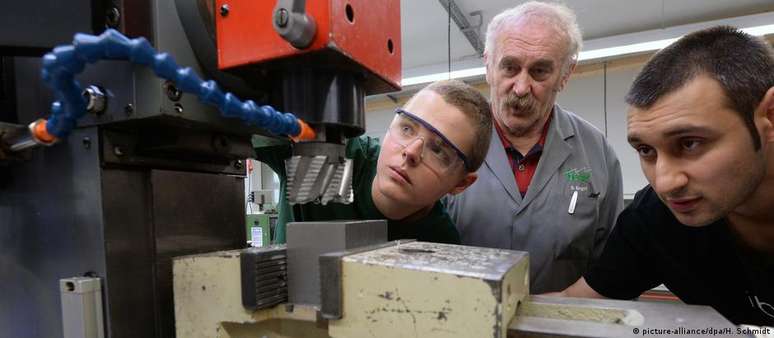Employers in the country complain of a lack of skilled professionals in several sectors. But experts point out that the solution could lie in better working conditions and wages, as well as facilitating immigration. A shoemaker complains that his children do not want to take over his company and prefer to attend university. Looking for an apprentice, according to him, is a waste of time. The blacksmith at the nearby riding school says he tried to keep his apprentice employed after his apprenticeship, but he didn’t. Now finding a replacement is very difficult. Your neighbor, who works for a large company, is constantly looking for information technology (IT) specialists. And in every cafe in the city there are signs with the inscription: “Personnel wanted.”
“Many companies are already severely affected by the shortage of skilled workers,” informs the German economy ministry. “Over 50% of companies see this as the biggest threat to their business.” There is already a shortage of suitable staff in many companies – and it is likely to get worse. In the coming years, the generation of the population explosion that occurred after the war will retire. According to the Institute for the Labor Market and Employment Research, by 2035 there will be a shortage of seven million skilled workers in Germany.
Record employment and falling real wages
But are there really few skilled workers in Germany? Labor market economist Simon Jäger, who heads the Institute for Labor Studies (IZA) in Bonn, says no: ‘Which speaks against the shortage of skilled workers: We now have record numbers of people employed in Germany There have never been so many people in the labor market: around 46 million people”.
Young people also tend to be better educated than those retiring. He also points out that wages in Germany have fallen sharply in real terms, i.e. by 5.7% last year. “And this is not consistent with the thesis that labor has become extremely scarce.” Because, according to him, in a market economy, the price is formed according to supply and demand, and a scarce good tends to be more expensive.
Untapped potential in skilled workers
“Certain structural conditions have been established in Germany to have an internal reserve of workers that is not used,” says Jäger, who finished his doctorate in 2016 at Harvard University in the US and was a professor at the Massachusetts Institute of technology (MIT).
On the one hand, Jäger refers to the so-called “silent reserve”. They are people “who would like to work, but are unable to enter the job market. Or there are part-time workers who would also work full-time, but under different conditions”.
“The income taxation of married couples in Germany also contributes to the fact that many of those who earn less than their partners have tax incentives which lead them to give up looking for a more lucrative job or to work harder,” says Jäger. Better childcare provision or more flexible working hours could also encourage people to become more active in the labor market, according to the expert.
According to the German Federal Employment Agency, 11% of those working only 20 hours a week say they want to extend their hours. However, this is usually not possible because these people need to care for children or people in need of care.
The head of the Federal Employment Agency, Andrea Nahles, would like workers about to retire to stay longer in the job market. “More than a million are willing to continue working,” says Nahles. Many would be interested in continuing to do useful work, for example part-time. The bosses are therefore called upon to find creative solutions.
Where to use scarce resources?
“In my hometown Bonn, there is a good example of a hairdresser who, like all hairdresser owners, was desperate for employees,” says Jäger. When applicants were told they too could only work four days a week, the number of applicants suddenly increased.
“This also applies to many other industries,” says Jäger. According to him, there is evidence that among caregivers, for example, more than 200,000 nurses who now work in other professions would be willing to return to nursing if wages and working conditions were correspondingly attractive.
“In other words, in the end, the problem of the avoidable shortage of skilled workers is a matter of scarce resources. While we don’t have an infinite number of people who can work, there have never been as many employed people as there are now. And the question is: where do we want to use these scarce resources?” asks Jäger.
“Companies have to radically change what they offer in terms of jobs and quality of life. They have to woo people,” also says Stefan Schaible, president of the Roland Berger consulting firm. “Employers who still don’t understand that they have to invest in their people are in dire straits.”
It won’t work without immigration
However, the Minister of Labour, Hubertus Heil, is convinced that, despite everything, the country’s potential is not sufficient to cover the future need for skilled workers. “Even though we’ve tapped all of the domestic potential, we still need more skilled immigration to keep our economy going,” says Heil.
Labor market experts believe that net immigration of 400,000 people a year is needed to fill the gap in the German labor market. So far, controlled labor immigration from other countries has been limited to a maximum of around 60,000 people a year.
Attractive immigration country
“Germany remains very interesting,” says Jäger. “When people are asked which countries they would like to migrate to, Germany regularly ranks first alongside the United States, other European countries and New Zealand.” Of course, the German language is at a disadvantage compared to English-speaking countries. “But we also have advantages, such as a functioning rule of law or a stable political system. These factors are important for the long-term prospects of immigrants.”
Furthermore, migrants also tend to pay attention to the wage level and potential standard of living they can enjoy in the country of immigration. And they also evaluate whether they are wanted in the country of immigration and whether they can acquire citizenship.
To promote a welcoming culture, it is useful to convey to people in Germany that immigration has added value for them. An incentive for the arrival of foreign workers would be to make immigration law less bureaucratic.
Source: Terra
Rose James is a Gossipify movie and series reviewer known for her in-depth analysis and unique perspective on the latest releases. With a background in film studies, she provides engaging and informative reviews, and keeps readers up to date with industry trends and emerging talents.







